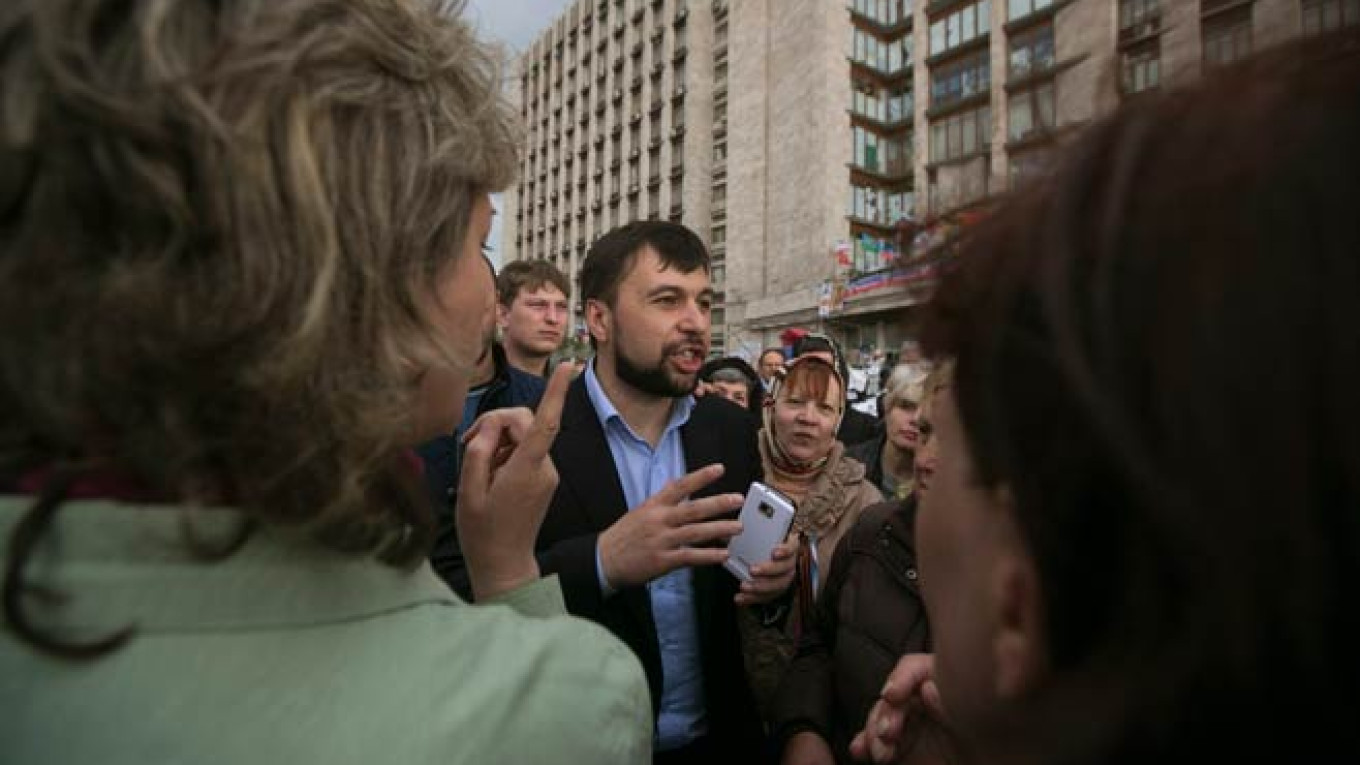News travels fast. But not in the Donetsk People's Republic.
Denis Pushilin, the head of this self-proclaimed republic of eastern Ukraine, was not aware he had been sanctioned by the European Union when The Moscow Times contacted him on Tuesday afternoon.
"I did not know that any sanctions had been imposed on me," Pushilin said in a telephone interview. "This is the first time I have heard anything of the sort. But these sanctions do not disturb me at all. They are just threats and, plus, I do not have any assets in the EU."
Pushilin is one of the 15 Russian officials and representatives of the pro-Russian separatists of eastern Ukraine that were targeted by the latest round of EU sanctions on Tuesday. This third round of European sanctions comes one day after the U.S. expanded its blacklist of Russian companies and officials in response to "Russia's continued illegal intervention in Ukraine."
The EU, which has sanctioned 48 individuals since Russia's annexation of Crimea in March, has ordered a travel ban and asset freezes on Russian officials including Deputy Prime Minister Dmitry Kozak, General Valery Gerasimov, the head of the general staff of the Russian Armed Forces, and the vice speaker of the State Duma, Lyudmila Shvetsova.
Europe's sanctions on Russia have arguably been much milder than those of the U.S. The EU, which is Russia's primary trading partner and relies on the country for one-third of its oil and gas, spared business leaders and Russian companies in its latest round of sanctions. Unlike the U.S., the EU did not sanction Igor Sechin, the head of state-owned oil and gas giant Rosneft.
Maja Kocijancic, the spokesperson of EU foreign affairs chief Catherine Ashton, wrote to The Moscow Times that the sanctioned individuals were selected on the basis of their role in Russia's "actions against the territorial integrity, sovereignty and independence of Ukraine." She said EU member states had unanimously agreed on sanctioning these individuals and were preparing for the potential addition of names to the list.
The Russian Foreign Ministry condemned the latest EU sanctions in a strongly worded statement released on its website on Tuesday, calling the European reaction an "unfriendly gesture" that followed in "Washington's footsteps."
"If this is how someone in Brussels hopes to stabilize the situation in Ukraine, then this is clear evidence of a complete misunderstanding of the country's political situation and an open invitation for local neo-Nazis to continue their lawlessness and extrajudicial killings of the civilian population of the southeast," the statement read. "Aren't you ashamed?"
Foreign Minister Sergei Lavrov told Itar-Tass that Russia "rejected" the "illogical" sanctions imposed by the U.S. and EU.
Deputy Foreign Minister Sergei Ryabkov told Gazeta.ru on Tuesday that Russia was still pondering the exact nature of the symmetrical sanctions it would impose on the U.S. and EU.
But according to Stanislav Belkovsky, the director of the Moscow-based National Strategy Institute,? Russia's purported indifference and defiance in the face of Western sanctions masks the unspoken apprehension of Russia's elite.
"Putin personally does not care about these sanctions, but they remain a concern for Russia," Belkovsky said. "The sanctions will hurt the Russian economy and they worry Russia's economic leaders that have based the development of the country on the Western model. The sanctions also have the potential to alienate the elite from Putin."
Belkovsky added that the de-escalation of the conflict was in Putin's hands but that his government remained reluctant to begin serious negotiations with the West.
"Putin wants to be viewed as deciding the fate of humanity," Belkovsky said. "We can expect a dramatic, Syria-like resolution where Putin will be presented as having saved Ukraine. But this can only happen if Putin comes to the negotiation table."
Japan joined the U.S., Canada and EU in its imposition of new sanctions on Russia on Tuesday.
The Japanese government announced it was imposing visa bans on 23 Russian officials but has yet to reveal their identity. The country had imposed a first round of sanctions against Russia — which included the suspension of consultations on liberalizing its bilateral visa regime — following the annexation of Crimea. (MT)
Contact the author at g.tetraultfarber@imedia.ru
A Message from The Moscow Times:
Dear readers,
We are facing unprecedented challenges. Russia's Prosecutor General's Office has designated The Moscow Times as an "undesirable" organization, criminalizing our work and putting our staff at risk of prosecution. This follows our earlier unjust labeling as a "foreign agent."
These actions are direct attempts to silence independent journalism in Russia. The authorities claim our work "discredits the decisions of the Russian leadership." We see things differently: we strive to provide accurate, unbiased reporting on Russia.
We, the journalists of The Moscow Times, refuse to be silenced. But to continue our work, we need your help.
Your support, no matter how small, makes a world of difference. If you can, please support us monthly starting from just $2. It's quick to set up, and every contribution makes a significant impact.
By supporting The Moscow Times, you're defending open, independent journalism in the face of repression. Thank you for standing with us.
Remind me later.


